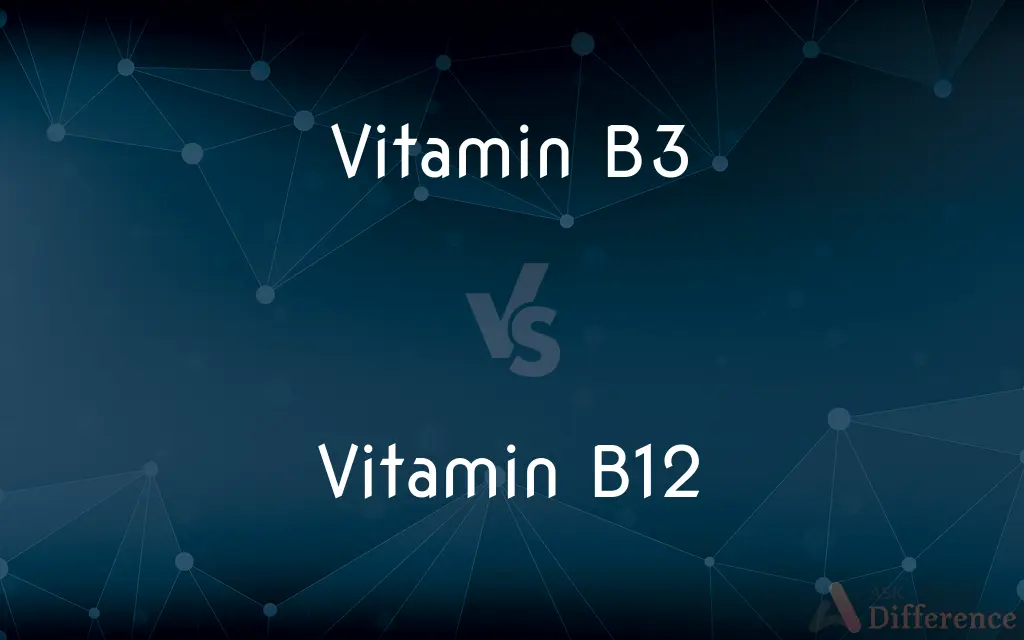Vitamin B3 vs. Vitamin B12 — What's the Difference?
Edited by Tayyaba Rehman — By Fiza Rafique — Published on November 23, 2023
Vitamin B3 aids metabolism and reduces cholesterol; Vitamin B12 supports nerve function and helps make DNA. Both are essential B vitamins.

Difference Between Vitamin B3 and Vitamin B12
Table of Contents
ADVERTISEMENT
Key Differences
Vitamin B3, also known as niacin, plays a crucial role in converting the food we eat into usable energy. Vitamin B12, on the other hand, known as cobalamin, is vital for nerve tissue health and the production of red blood cells. Both vitamins are essential to maintain optimal health but serve different functions in the body.
The deficiency of Vitamin B3 can lead to a condition called pellagra, characterized by diarrhea, dementia, and dermatitis. Vitamin B12 deficiency, in contrast, can lead to anemia, fatigue, weakness, and even nerve damage. Recognizing the significance of both vitamins, it's clear that each addresses different health concerns.
Vitamin B3 is predominantly found in foods like tuna, chicken, and turkey. Vitamin B12, conversely, is primarily present in animal products like meats, fish, poultry, eggs, and dairy. This distinction in sources emphasizes the different nutritional landscapes they inhabit.
In terms of supplements, Vitamin B3 might be advised for those with high cholesterol or to prevent heart disease. Vitamin B12 supplements are often recommended for vegans, vegetarians, and the elderly, as absorption can decrease with age or dietary restrictions.
Comparison Chart
Also Known As
Niacin
Cobalamin
ADVERTISEMENT
Main Function
Metabolism, reduces cholesterol
Nerve function, red blood cell production
Common Deficiency Effects
Pellagra
Anemia, nerve damage
Primary Food Sources
Tuna, chicken, turkey
Meats, fish, eggs, dairy
Recommended For
High cholesterol patients
Vegans, vegetarians, elderly
Compare with Definitions
Vitamin B3
Can aid in lowering bad cholesterol levels.
Some people take Vitamin B3 supplements to manage their cholesterol levels.
Vitamin B12
Supports the maintenance of the nervous system.
Vitamin B12 is crucial for proper nerve function throughout the body.
Vitamin B3
A vitamin that assists in converting food into energy.
Consuming enough Vitamin B3 is essential for efficient energy production.
Vitamin B12
Known scientifically as cobalamin.
People who don't consume animal products may lack cobalamin or Vitamin B12.
Vitamin B3
Helps maintain healthy skin and nerves.
For healthy skin, ensure your diet has adequate Vitamin B3.
Vitamin B12
Helps in metabolizing proteins and fats.
To support your metabolism, ensure a regular intake of Vitamin B12.
Vitamin B3
Also known as niacin.
Many processed foods are fortified with Vitamin B3 or niacin.
Vitamin B12
Essential for the formation of red blood cells.
A lack of Vitamin B12 can lead to anemia.
Vitamin B3
Essential for proper digestion.
Vitamin B3 supports the digestive system, promoting a healthy appetite.
Vitamin B12
Assists in DNA synthesis and renewal.
For cellular health, it's crucial to maintain adequate Vitamin B12 levels.
Common Curiosities
What is another name for Vitamin B3?
Vitamin B3 is also known as niacin.
Why is Vitamin B12 essential for the body?
Vitamin B12 is vital for nerve function, red blood cell formation, and DNA synthesis.
Can a deficiency in Vitamin B3 lead to any health issues?
Yes, a deficiency in Vitamin B3 can cause pellagra, leading to diarrhea, dementia, and dermatitis.
What might result from a Vitamin B12 deficiency?
A deficiency in Vitamin B12 can cause anemia, fatigue, weakness, and nerve damage.
Who is often recommended to take Vitamin B12 supplements?
Vitamin B12 supplements are usually advised for vegans, vegetarians, and the elderly.
Is Vitamin B12 found in plant-based foods?
Vitamin B12 is primarily in animal products, so it's rare in plant-based foods.
In which foods can I find Vitamin B3?
Vitamin B3 is found in foods like tuna, chicken, and turkey.
Are Vitamin B3 and Vitamin B12 water-soluble?
Yes, both Vitamin B3 and Vitamin B12 are water-soluble vitamins.
Why might someone take a Vitamin B3 supplement?
People might take Vitamin B3 supplements to manage cholesterol levels or prevent heart disease.
Do both vitamins support metabolism?
Yes, Vitamin B3 aids metabolism by converting food into energy, while Vitamin B12 helps metabolize proteins and fats.
Share Your Discovery

Previous Comparison
Species Richness vs. Species Diversity
Next Comparison
Peonies vs. RanunculusAuthor Spotlight
Written by
Fiza RafiqueFiza Rafique is a skilled content writer at AskDifference.com, where she meticulously refines and enhances written pieces. Drawing from her vast editorial expertise, Fiza ensures clarity, accuracy, and precision in every article. Passionate about language, she continually seeks to elevate the quality of content for readers worldwide.
Edited by
Tayyaba RehmanTayyaba Rehman is a distinguished writer, currently serving as a primary contributor to askdifference.com. As a researcher in semantics and etymology, Tayyaba's passion for the complexity of languages and their distinctions has found a perfect home on the platform. Tayyaba delves into the intricacies of language, distinguishing between commonly confused words and phrases, thereby providing clarity for readers worldwide.
















































